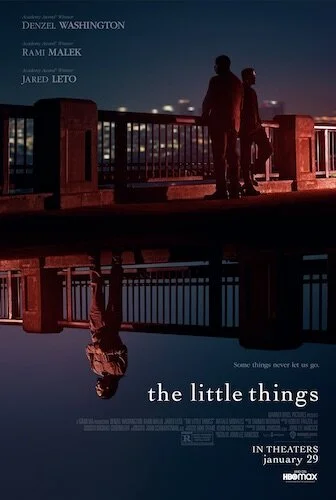The Little Things
Written by Andreas Babiolakis
We are playing catch up by reviewing films that are a part of the current awards season.
In ways, John Lee Hancock’s The Little Things (a passion project of his since the early ‘90s) is a well made film. The bleak cinematography is confining, yet also so epic in scale, as the fog of a Californian suburb tries to fill up the endless landscape. Thomas Newman’s score feels almost like a Reznor-Ross collaboration, but it’s also entirely Newman’s, and a major focal point of the picture (it broods and lingers enough to disturb you or capture your heart). Then, you realize that The Little Things is, well, not very well made at all, and its story is a top fifty list of every neo-noir trope (catch phrases included), stretched out to the point of being borderline unbearable. For a film titled The Little Things, this “thriller” really is as bland as the genre can get, and completely forgets how to incorporate any sort of nuance or definable quality whatsoever. Even though the screenplay is older than this David Fincher film, I couldn’t help but think of Se7en — like many critics — for the entire second act of this flick (the antagonizing suspect, the personal griefs, the fixation on crime as a genre in a meta sense). I feel like maybe Hancock couldn’t pry himself away from this other film with the execution, here. If that’s true, then The Little Things is less of a new-day Se7en, and more of a 4our out of 10n.
Here to save the day — in varying degrees — are the film’s big three. The least effective is Rami Malek as a privileged Detective who is trying his best at his job, only to find himself detaching from his family more and more; threats are his reminder to protect his family as much as he oversees his city (Malek is still great in this role, by the way, but he’s the least memorable of the three). Denzel Washington is forever impressive, and that’s no different here; he is a warm — yet switched-on — sheriff who is the voice of wisdom. Finally, the obvious: Jared Leto is in top form here as the lead suspect of this picture, who is a fanatic of crimes and investigations. He loves toying with people, and Leto makes him so neutrally creepy. This isn’t a movie villain: this is a real monster, who is either actually a psychopath, or is a jerk who doesn’t have anything better to do with his time. Either way, Leto is fantastically reserved here (which is surprising, given how often he vows to overdo his characterization of his own roles).
Pictured: the aesthetic of the film not being able to get the story to cooperate and be as interesting.
Alas, let’s not forget what this film is: The Little Things. It’s all about the little things, like the diabolical dialogue which has Leto’s character (mid-bravura-performance, mind you) actually say “poop”; like the abysmal pacing that can make waiting at the DMV feel like a Wimbledon showdown; like the constant bringing-up of said “little things” in relation to life, evidence, and more, but is never applied to this by-the-numbers exercise of crime cinema. Usually, a film that takes nearly thirty years to make feels over-made, not under. You’re meant to ask yourself whether or not Albert Sparma actually committed the central crime, but you might find yourself (like me) really not caring at all. The only little things I really focused on after the mildly-interesting climax was how strained my legs felt (and that I needed a stretch), how badly I needed the bathroom (I actually didn’t, but that felt like a more entertaining matter to tend to), and how a film with this much promise could have been this boring. When your main villain is actually saying the most basic threats of the year (“You don’t matter”, I believe, was one), and you can’t tell if he’s being condescending towards the detective he’s facing or if he’s just that badly written, the “little” things don’t matter; you’ve got big problems.
Andreas Babiolakis has a Masters degree in Film and Photography Preservation and Collections Management from Ryerson University, as well as a Bachelors degree in Cinema Studies from York University. His favourite times of year are the Criterion Collection flash sales and the annual Toronto International Film Festival.






